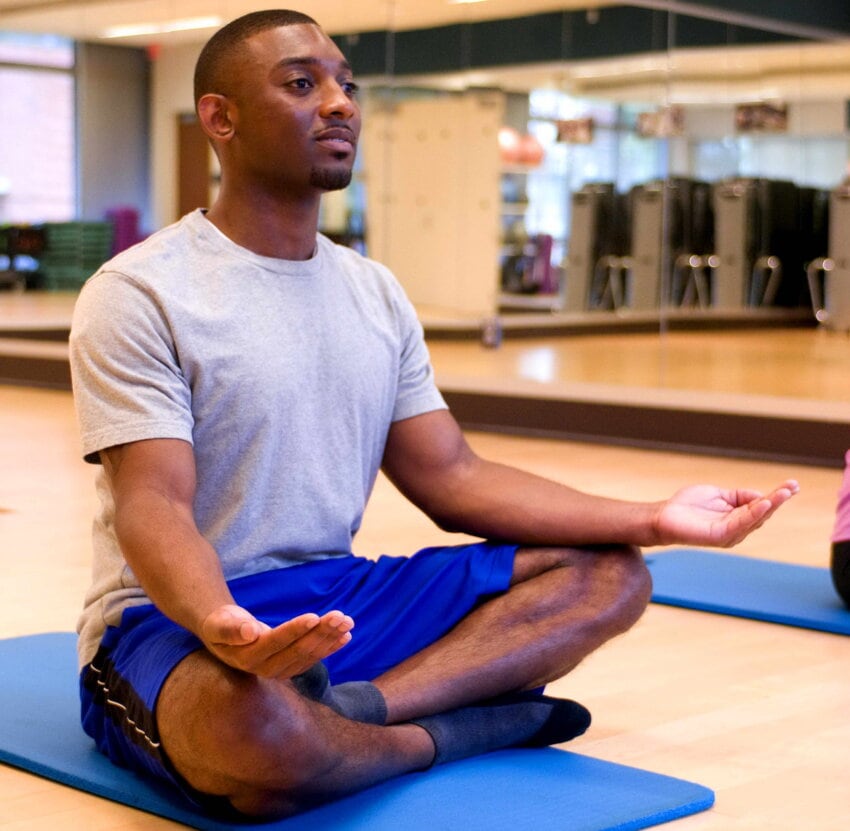3.3 Coping
The health consequences of chronic stress depend on an individual’s coping styles and their resilience to real or perceived stress. Coping refers to cognitive and behavioral efforts made to master, tolerate, or reduce external and internal demands and conflicts.[1]
Coping strategies are actions, a series of actions, or thought processes used in meeting a stressful or unpleasant situation or in modifying one’s reaction to such a situation. Coping strategies are classified as adaptive or maladaptive. Adaptive coping strategies include problem-focused coping and emotion-focused coping. Problem-focused coping typically focuses on seeking treatment such as counseling or cognitive behavioral therapy. Emotion-focused coping includes strategies such as mindfulness, meditation, and yoga; using humor and jokes; seeking spiritual or religious pursuits; engaging in physical activity or breathing exercises; and seeking social support.
Maladaptive coping responses include avoidance of the stressful condition, withdrawal from a stressful environment, disengagement from stressful relationships, and misuse of drugs and/or alcohol.[2] Nurses can educate individuals and their family members about adaptive, emotion-focused coping strategies and make referrals to interprofessional team members for problem-focused coping and treatment options for individuals experiencing maladaptive coping responses to stress.
Emotion-Focused Coping Strategies
Nurses can educate clients about many emotion-focused coping strategies, such as meditating, practicing yoga, journaling, praying, spending time in nature, nurturing supportive relationships, and practicing mindfulness.
Meditation
Meditation can induce feelings of calm and clearheadedness and improve concentration and attention. Research has shown that meditation increases the brain’s gray matter density, which can reduce sensitivity to pain, enhance the immune system, help regulate difficult emotions, and relieve stress. Meditation has been proven helpful for people with depression and anxiety, cancer, fibromyalgia, chronic pain, rheumatoid arthritis, type 2 diabetes, chronic fatigue syndrome, and cardiovascular disease.[3] See Figure 3.3[4] for an image of an individual participating in meditation.

Yoga
Yoga is a centuries-old spiritual practice that creates a sense of union within the practitioner through physical postures, ethical behaviors, and breath expansion. The systematic practice of yoga has been found to reduce inflammation and stress, decrease depression and anxiety, lower blood pressure, and increase feelings of well-being.[5] See Figure 3.4[6] for an image of an individual participating in yoga.

Journaling
Journaling can help a person become more aware of their inner life and feel more connected to experiences. Studies show that writing during difficult times may help a person find meaning in life’s challenges and become more resilient in the face of obstacles. When journaling, it can be helpful to focus on three basic questions: What experiences give me energy? What experiences drain my energy? Were there any experiences today where I felt alive and experienced “flow”? Allow yourself to write freely, without stopping to edit or worry about spelling and grammar.[7]
Prayer
Prayer can elicit the relaxation response, along with feelings of hope, gratitude, and compassion, all of which have a positive effect on overall well-being. There are several types of prayer rooted in the belief that there is a higher power. This belief can provide a sense of comfort and support in difficult times. A recent study found that adults who were clinically depressed who believed their prayers were heard by a concerned presence responded much better to treatment than those who did not believe.[8]
Individuals can be encouraged to find a spiritual community, such as a church, synagogue, temple, mosque, meditation center, or other local group that meets to discuss spiritual issues. The benefits of social support are well-documented, and having a spiritual community to turn to for fellowship can provide a sense of belonging and support.[9]
Spending Time in Nature
Spending time in nature is cited by many individuals as a spiritual practice that contributes to their mental health.[10] Spirituality is defined as a dynamic and intrinsic aspect of humanity through which persons seek ultimate meaning, purpose, and transcendence and experience relationship to self, family, others, community, society, nature, and the significant or sacred.[11] Spiritual needs and spirituality are often mistakenly equated with religion, but spirituality is a broader concept. Other elements of spirituality include meaning, love, belonging, forgiveness, and connectedness.[12]
Supportive Relationships
Individuals should be encouraged to nurture supportive relationships with family, significant others, and friends. Relationships aren’t static – they are living, dynamic aspects of our lives that require attention and care. To benefit from strong connections with others, individuals should take charge of their relationships and devote time and energy to support them. It can be helpful to create rituals together. With busy schedules and the presence of online social media that offer the façade of real contact, it’s very easy to drift from friends. Research has found that people who deliberately make time for gatherings enjoy stronger relationships and more positive energy. An easy way to do this is to create a standing ritual that you can share and that doesn’t create more stress, such as talking on the telephone on Fridays or sharing a walk during lunch breaks.[13]
Mindfulness
Mindfulness has been defined as, “Awareness that arises through paying attention, on purpose, in the present moment, and nonjudgmentally.” Mindfulness has also been described as, “Non-elaborative, nonjudgmental, present-centered awareness in which each thought, feeling, or sensation that arises is acknowledged and accepted as it is.” Mindfulness helps us be present in our lives and gives us some control over our reactions and repetitive thought patterns. It helps us pause, get a clearer picture of a situation, and respond more skillfully. Compare your default state to mindfulness when studying for an exam in a difficult course or preparing for a clinical experience. What do you do? Do you tell yourself, “I am not good at this” or “I am going to look stupid”? Does this distract you from paying attention to studying or preparing? How might it be different if you had an open attitude with no concern or judgment about your performance? What if you directly experienced the process as it unfolded, including the challenges, anxieties, insights, and accomplishments, while acknowledging each thought or feeling and accepting it without needing to figure it out or explore it further? If practiced regularly, mindfulness helps a person start to see the habitual patterns that lead to automatic negative reactions that create stress. By observing these thoughts and emotions instead of reacting to them, a person can develop a broader perspective and can choose a more effective response.[14]
Try free mindfulness activities at the Free Mindfulness Project.
Coping with Loss and Grief
In addition to assisting individuals recognize and cope with their stress and anxiety, nurses can also use this knowledge regarding coping strategies to support clients and their family members as they cope with life changes, grief, and loss that can cause emotional problems and feelings of distress.
Review concepts and nursing care related to coping with grief and loss in the “Grief and Loss” chapter of Open RN Nursing Fundamentals.
- Amnie, A. G. (2018). Emerging themes in coping with lifetime stress and implication for stress management education. SAGE Open Medicine, 6. https://doi.org/10.1177%2F2050312118782545 ↵
- Amnie, A. G. (2018). Emerging themes in coping with lifetime stress and implication for stress management education. SAGE Open Medicine, 6. https://doi.org/10.1177%2F2050312118782545 ↵
- Delagran, L. (n.d.). What is spirituality? University of Minnesota. https://www.takingcharge.csh.umn.edu/what-spirituality ↵
- “yoga-class-a-cross-legged-palms-up-meditation-position-850x831.jpg” by Amanda Mills, USCDCP on Pixnio is licensed under CC0 ↵
- Delagran, L. (n.d.). What is spirituality? University of Minnesota. https://www.takingcharge.csh.umn.edu/what-spirituality ↵
- “9707554768.jpg” by Dave Rosenblum is licensed under CC BY 2.0 ↵
- Delagran, L. (n.d.). What is spirituality? University of Minnesota. https://www.takingcharge.csh.umn.edu/what-spirituality ↵
- Delagran, L. (n.d.). What is spirituality? University of Minnesota. https://www.takingcharge.csh.umn.edu/what-spirituality ↵
- Delagran, L. (n.d.). What is spirituality? University of Minnesota. https://www.takingcharge.csh.umn.edu/what-spirituality ↵
- Yamada, A., Lukoff, D., Lim, C. S. F., & Mancuso, L. L. (2020). Integrating spirituality and mental health: Perspectives of adults receiving public mental health services in California. Psychology of Religion and Spirituality, 12(3), 276–287. https://doi.org/10.1037/rel0000260 ↵
- Puchalski, C. M., Vitillo, R., Hull, S. K., & Reller, N. (2014). Improving the spiritual dimension of whole person care: Reaching national and international consensus. Journal of Palliative Medicine, 17(6), 642–656. https://doi.org/10.1089/jpm.2014.9427 ↵
- Rudolfsson, G., Berggren, I., & da Silva, A. B. (2014). Experiences of spirituality and spiritual values in the context of nursing - An integrative review. The Open Nursing Journal, 8, 64–70. https://dx.doi.org/10.2174%2F1874434601408010064 ↵
- Delagran, L. (n.d.). What is spirituality? University of Minnesota. https://www.takingcharge.csh.umn.edu/what-spirituality ↵
- Delagran, L. (n.d.). What is spirituality? University of Minnesota. https://www.takingcharge.csh.umn.edu/what-spirituality ↵
Cognitive and behavioral efforts made to master, tolerate, or reduce external and internal demands and conflicts.
An action, series of actions, or a thought process used in meeting a stressful or unpleasant situation or in modifying one’s reaction to such a situation.
Coping strategies including problem-focused coping and emotion-focused coping.
Adaptive coping strategies that typically focus on seeking treatment such as counseling or cognitive behavioral therapy.
Adaptive coping strategies such as mindfulness, meditation, and yoga; using humor and jokes; seeking spiritual or religious pursuits; engaging in physical activity or breathing exercises; and seeking social support.
Ineffective responses to stressors such as avoidance of the stressful condition, withdrawal from a stressful environment, disengagement from stressful relationships, and misuse of drugs and/or alcohol.

